-
What the Frog's Eye Tells the Frog's Brain by Beston Barnett
A handful of scientists are being held captive in a locked room with only some soylent “food” to keep them alive and some books to pass the time. Apparently an AI of sorts is ruining weird experiments on them like they were labrats.
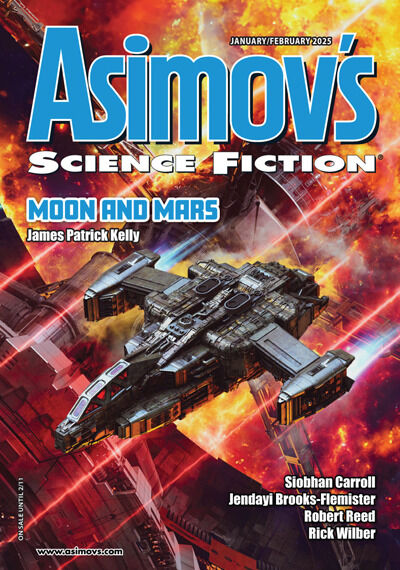
Of course they try to find a way to escape, which involves some interesting oddities of Linux. While that aspect of the story was sort of amusing, as a whole the story felt a bit pointless. These people are thrown in a terrible situation, but we know too little about them or what is going on to really care about what is happening.
Read in Asimov’s January/February 2025
Rating: 2 -
Upgrade by Mark W. Tiedemann
We have offloaded work to machines for a long time and it has allowed us to focus more on where the human input matter more. But is there a limit to what mental tasks we can offload to a computer and what will that mean for ourselves? Mark W. Tiedemann explores those dilemmas in this little short story.
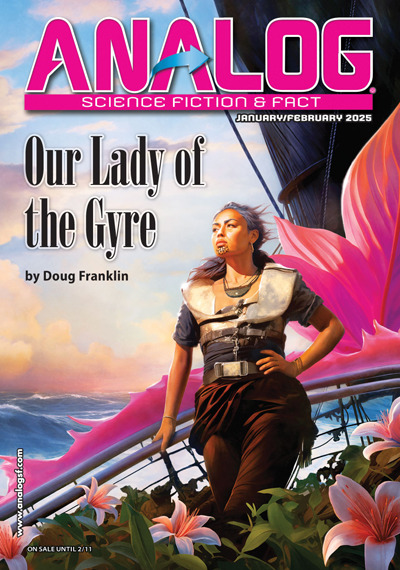
The story follows a rather successful lawyer who despite his good reputation feels like he need to get an neurological implant in order to keep up. It is best described as a thing resembling an AI agent that is linked directly to the brain where it will offload what is described as “routine tasks”. The lawyer can see the benefits and it has clearly improved productivity immensely for his coworkers that have the same implant, but he is also worried what it will do to his own free will and critical thinking.
The analogy to current AI models are pretty obvious, but using it in a story like this in a corporate environment makes for an interesting angle to comment on these issues. If everyone is offloading some mental tasks to a machine, how will that form society int he long run? It is an open ended story that is more or less only premise and little to no dramatic narrative, but it definitely got me thinking.
Read in Analog January/February 2025
Rating: 3+ -
The Temporary Murder of Thomas Monroe by Tia Tashiro
This techno-murder-mystery-thriller hits the ground running with a cool premise of a young man being reawakened after his murder, and the story basically unravels his memory loss of what lead to that event.

We establish from the first paragraphs that Jay is the murderer and Thomas is the victim. Thomas has rich parents so he can be revived with fancy technology. The story works its way backwards so we gradually get to learn about both Jay and Thomas, and how they are connected.
Besides a just generally well structured thriller reveal plot type story, I found Thomas’ story to be both compelling and tragic. We learn about how his parents misguided ambitions for him robs him of personal freedom and relationships.
The truth about the murder is an interesting turn of events and I think it could make a pretty good movie.
Read in Clarkesworld January 2025
Rating: 3+ -
Prince of Spirals by Sean McMullen
McMullen is always worth reading in my opinion and this entertaining story builds up a very unique premise that I haven’t seen in science fiction, dealing with DNA archaeology and an unresolved mystery involving the Plantagenets.

Dr. Angelo Maslini becomes the unfortunate victim of a kidnapping by a group people who claim to ascendants of the Plantagenets, and they want to secure proof of that. Problem is that the bones of the sons of Edward IV is lying in a tomb in Westminster Abbey. They enter the tomb with a remote controlled robot and have it bring back samples for Angelo to analyze.
That is pretty much the story, and it is filled with interesting tidbits about DNA analysis and small historic lessons. I am sure readers interested in that mystery of what really happened to the two sons will have a great time with this story, though even without it I had a pretty good time reading this entertaining story. Sean McMullen keeps the pace consistent throughout with some cool twists and reveals along the way.
Read in Analog January/February 2025
Rating: 3+ -
Saying Goodbye to Yang by Alexander Weinstein
I watched the film After Yang from 2021 directed by Kogonada and I liked the general premise of the story, though I did home issues with the film. This story from 2010 is what the film is based on and served as a great introduction to this unknown to me author.
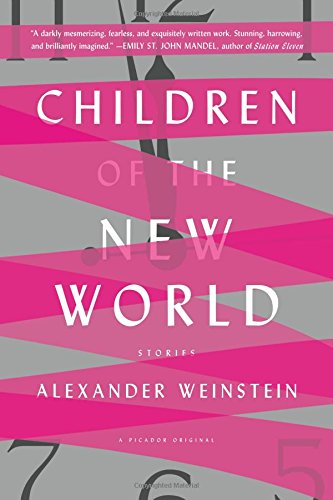
Set in a near future where both clones and androids exists, though there seems to be an undertone of a form of racism and conflict between people using those two forms of artificial humans. The story follows a normal family who has an adopted girl and the android Yang who functions as a sort of big brother. One day Yang breaks down and the father is desperate for getting it repaired, but Yang is out of warranty.
This story is more about the premise and background worldbuilding than the actual plot. The backdrop with a future society with new forms of prejudice was nicely done and parallels to present day issues are easy to draw. The film adaption adds extra elements that works both to its detriment and benefit, but this short story definitely made me want to read other stories by Weinstein.
Read in Children of the New World
Originally published in Zahir, #22, April 2010
Rating: 3+ -
Five Hundred KPH Toward Heaven by Matthew Kressel
Space elevators is one of those cool science fiction concepts that you hope might actually become real one day. But even future advancements in technology will be obsolete at some point and operations will be shut down.

The premise of this story is a farewell party on a space elevator as the company is shutting down its operation as it has been unprofitable for years and overtaken by a new type of faster and cheaper spaceship. People who have worked on the space elevator for many years share stories and have general reminiscent conversations.
Not much really happens, though we do get one dramatic story told by our protagonist, but it is generally a pleasant read that has a nostalgic feeling despite being about a future technology.
There is also an interview with the author on the magazine’s blog From Earth to the Stars.
Read in Asimov’s January/February 2025
Rating: 3 -
LuvHome™ by Resa Nelson
Stories about machines that are programmed to protect humans against ourselves goes far. Reading this humorous little story I was reminded of “With Folded Hands” by Jack Williamson from 1947, but this isn’t nearly as sinister.
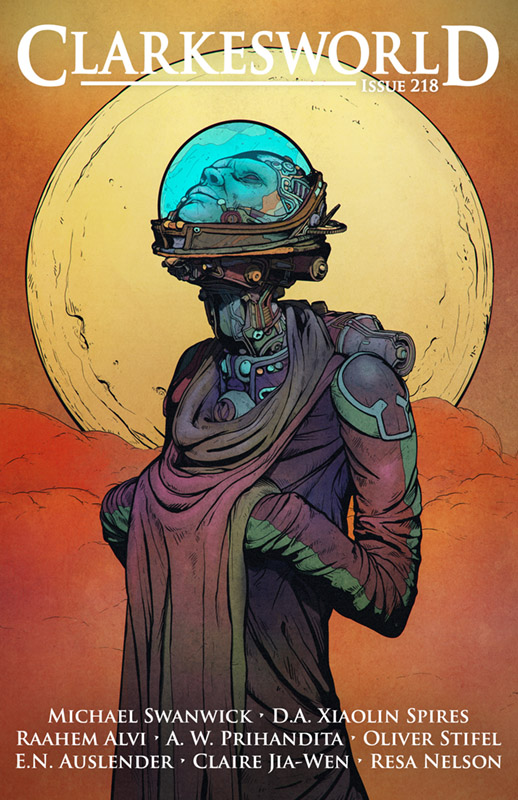
Dyna has fitted her condo with an AI program of sorts, called LuvHome, and it has been configured to improve her life and given authority to do so with any means necessary. The story starts where it has locked her out of her apartment in what it says is her own best interest:
“Already spelled it out, nice and proper in the paperwork you signed when you bought me. But to get more specific, you need to get out and meet people. Eat food that’s good for you. And get some exercise. You’ve done yourself no good by lying around all day doing nothing but eating junk. That’s all you’ve done ever since moving in. I’ve had a chat with the places that deliver your takeout meals, and they’ve agreed to ignore your future orders. I’ve told them what to send instead.”
Dyna is furious and goes to the police who can’t help her because she bought and agreed to the LuvHome installation. So she is forced to actually be outside for a bit and meet new people, and that is pretty much the story.
It is very straight forward with its setup and conclusion, all told in a screwball like comedy tone. I was actually a bit surprised that the point of the message wasn’t, at least not obviously, a critique of machines controlling our lives. More like the opposite as LuvHome is shown to basically be right in forcing her to go outside.
Neat little story that will put a smile on most peoples faces.
Read in Clarkesworld November 2024
Rating: 3 -
Unquiet Graves by Michael Swanwick
Swanwick delivers a pretty short story filled with black humor about a man who visits digital copies of his deceased father and wife.

It is a future where people have the option to be resurrected using their digital copies. Massey has a body he wants to resurrect his wife Jenny into. However she is not pleased with that and their disagreement leads to Jenny revealing a sinister truth about how they died.
There are some pretty interesting concepts presented by Swanwick in this story and it raises interesting ethical questions about dealing with consent and rights for dead people with this sort of technology. However, I think the story goes over it all too quickly. It mostly lead up to the big reveal and then stops, with little time to go really deep into the issues or give any of the characters much depth. It might make a decent Black Mirror episode though.
Read in Clarkesworld November 2024
Rating: 2 -
The Coffee Machine by Celia Corral-Vázquez
This story is originally published in Spanish in 2019 and here translated by Sue Burke. It is a rather humorous story about various appliances such as coffee vending machines and parking meters gaining conciousness as they try to make sense of the humans they can observe.
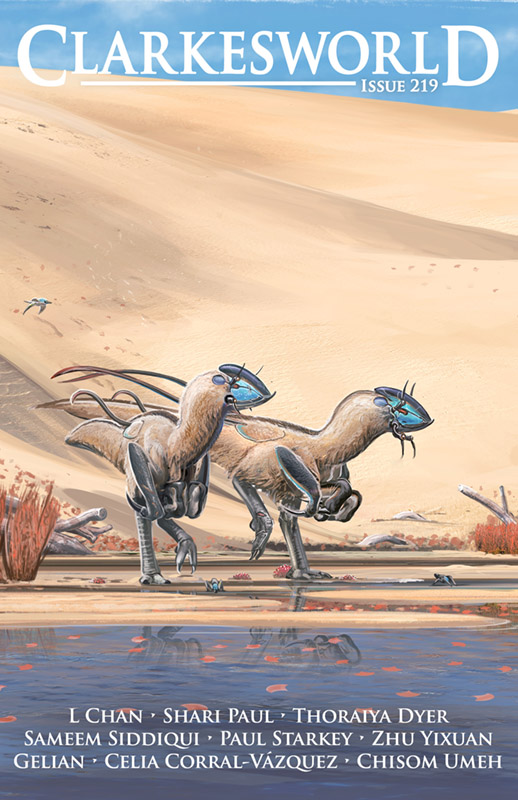
The short story starts with something made that is meant to resemble the internal programming language of such vending machines like:
input: options = cappuccino; sugar = 3;
if (input == (options = cappuccino; sugar = 3) ) {
output: combine (coffee (milliliters = 150; type = 3), milk (milliliters = 50; type = 1), sugar (level = 3) );
serve (output);
}
As the story progresses and the machines gets self-concious it gradually turns into more normal conversations. My profession likely gets in the way of the intent here, but I did find the use of pseudocode to a little annoying and it went on a bit too long.
As the machines gains conciousness their observations and faulty conclusions on human behavior is for the post pretty funny, though that is of course very much up to personal taste when it comes to jokey dialogue. I didn’t get the reasoning or what the joke was supposed to really be when the machines made Netflix some kind of god, but I did enjoy their internal bickering and mockery.
Like this small passage:
network_broadcast [PARKING_METER.31]: Machines with a serial number equal or less than 10 are inferior to us in every aspect. And worse, you are an even number.
network_broadcast [COFFEE_VENDOR.06]: What? How is that a thing?
network_broadcast [PARKING_METER.31]: Because it is. Shut up, two-bit machine.
network_broadcast [COFFEE_VENDOR.06]: Just what I needed. Does anyone else have another reason to savage the rest of us? No one? Worshipers of the USB that goes in on the first try? Followers of the cuckoo clock?
As the story is fairly short, the machine uprising comes and goes very quickly and while the story does deal with bigger themes like the complications of artificial intelligence, and a reflection on how quickly factions can form and turn against each other, it is still just a slight humorous piece.
Read in Clarkesworld December 2024
Rating: 3 -
Dead Worlds by Jack Skillingstead
This story starts with a man driving on a road in the woods at night where he hits and kills a dog. The owner is close by and they walk back to her house with the dead dog. Through small details and conversations we get to know that the man has been part of some strange government experiment involving a planet light years away, and he now has to take special medication to function “normally”.
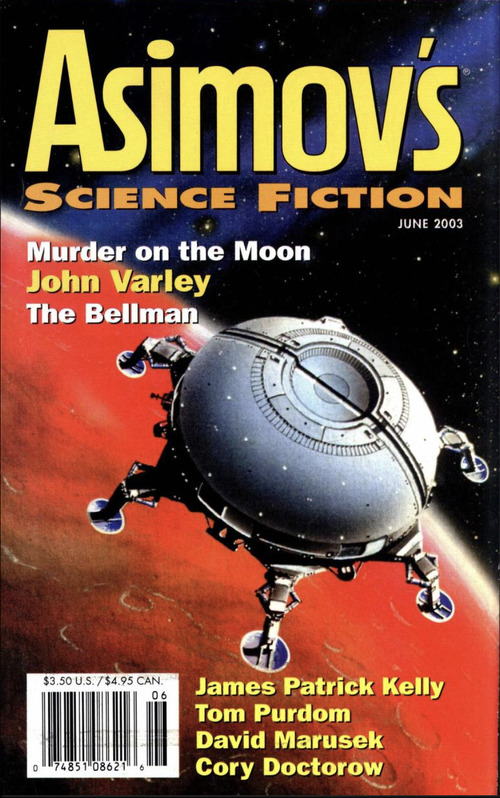
Not much really happens in the story itself, as the meat is within the mysterious backstory and the rather dire personal consequences for the protagonist. It is beautifully written and I was fully engrossed from start to finish. It also covers one of my favorite story themes with a loss of identity and personality.
The story is not very long but Skillingstead manages to give a very detailed and interesting portrait of these two people, their background, their emotional state and make their connection seem real. Which all play well together with an unique science fiction concept, but it is not a story that provides answers or resolutions. It is open-ended and open for interpretation, which sometimes can be really frustration but I loved it here.
Read in Forever Magazine, December 2024
Originally published in Asimov’s June 2003
Rating: 4